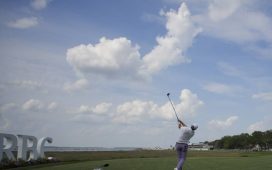The most jarring revelation of the last 24 hours wasn’t that the PGA Tour will now reward its most prominent players regardless of performance, but that a sport hitherto known as a citadel of conservative capitalism actually harbors a wealth of socialist sentiment. How else to explain the convulsive reaction when Golfweek revealed the existence — previously unannounced by the Tour — of the Player Impact Program, which will dispense $40 million in bonuses to 10 stars deemed to have most moved the needle in terms of fan engagement?
On social media (always a reliable indicator of the broader world), a remarkable number of golf fans who usually genuflect at the altar of Adam Smith were apoplectic at the idea of wealthy players receiving money for such nebulous reasons, dollars that could be used to benefit the greater good, whether boosting purses in the minor leagues, rehiring Tour employees laid off during the pandemic or otherwise growing the game. In short, anything except further swelling Rickie Fowler’s already tumescent bank account.
Who knew it was so easy to convert the “up-by-the-bootstraps” brigade into Bernie bros?
The Player Impact Fund is not a surprising development and shouldn’t be heatedly dismissed as a wrong-headed one. For all its charitable endeavors, the PGA Tour is a business and businesses everywhere incentivize those individuals deemed to deliver value. That value isn’t always easy to define and often harder to quantify. Much of the head-scratching about the Impact Fund centers on the metrics used to determine a player’s impact, a waggish assortment of measurements that achieve what any child in a schoolyard can do with the point of a finger: identify the cool kids people want to hang with.
The data points are worthy of scrutiny. How gameable are they? How is each weighted? Do they distinguish a guy who generates a little media coverage for a good deed from one who generates extensive coverage for lifting a ball he decides is embedded? The metrics are likely to be tweaked, just as we’ve seen the parameters of the FedEx Cup adjusted over the years. The only certainty in all of this is that Justine Reed now has a Reputation Defender rep on speed dial.

Patrick Reed looks over his putt during the first round of The Masters golf tournament at Augusta National. Michael Madrid-USA TODAY Sports
One of the more commonplace criticisms of the new bonus scheme is also the most specious: comparisons to the European Super League, which collapsed in the face of overwhelming public anger earlier this week just hours after being mooted. The ESL planned to have 12 of Europe’s biggest soccer clubs form their own league, leaving every other uninvited team and national league (and their fans) to subsist on crumbs or wither. But a comparison to the Player Impact Fund is as lazy as it is ill-suited.
The Tour’s bonus program is a defensive play to thwart the efforts of the Premier Golf League to do to professional golf what the ESL would have done to European soccer. PGL’s concept was built not on recruiting the best players but rather the biggest celebrities, ignoring form in favor of fame, and doing so by offering large guaranteed paydays. The guaranteed aspect is key: PGL would not be an enterprise where performance on the course determined earnings. You can’t expect a man to gloss over the odd bone saw murder of a journalist if you’re not going to pay him just because he shot a pair of 80s.
One fundamental that the PGL concept acknowledged — and which the Tour had willfully ignored in deference to its broader membership — is that every sport thrives on a handful of personalities who drive engagement. If they win, it’s a bonus. But not a requirement. That’s why PGL will never knock on Stewart Cink’s door, no matter how many more tournaments he wins this season. They know what a tally of the tickets Cink has sold and the viewers he has drawn will show: not much.
The PGA Tour had no alternative but to respond on the front PGL had opened: compensating players for what they bring to the overall product, not just for their competitive results. It’s the baseline commercial reality in every major league. The Mets didn’t lavish Francisco Lindor with $341 million just to hit a few dozen homers but for the value he adds to the franchise in tickets sold, merchandise shifted, viewers drawn, sponsors attracted. Athletes might be judged by what they do on the field, but they earn in large part for what they do off the field.
The PGA Tour is simply falling in line, rewarding guys whose contribution to the tide helps raise all boats, including the journeyman dinghies. Because if the PGL were to succeed, the Tour’s lower orders would find themselves playing for a lot less money in front of a smaller audience. Sponsors and fans aren’t likely to stick with a product that loses its biggest assets.

Stewart Cink celebrates with his son/caddie Reagan on the green of the 18th hole after winning the 2021 RBC Heritage. (Photo: Joshua S. Kelly-USA TODAY Sports)
The $40 million it costs to compensate those stars also helps keep money in the pockets of mere mortals. Cink earned $1.278 million for winning last week’s RBC Heritage. For his first Tour win in Hartford in 1997, Cink’s check was $270,000. We can credit the riches in men’s golf to Tiger Woods, but the PGA Tour can’t be dependent on Woods alone. The task of marketing the Tour falls to the small handful of guys who juice fan interest.
That means Fowler, even if you think he should win more. That means Bryson DeChambeau, even if you think he’s a self-important dork. That means Brooks Koepka, even if you think he’s a sullen, wannabe thug.
Given the scale of the Tour’s new TV rights deal, $40 million is a small sum. There is ample left to boost purses in the minor leagues, underwrite the European Tour and otherwise gild the lily.
It’s hardly a matter for debate that some folks bring more to the table than others. The Tour has hundreds of members, most of them perfectly admirable people who conduct themselves in a professional manner and get paid well when they perform. But every sport is populated with pilot fish who nibble on larger hosts, feasting on what they can’t obtain on their own strength. Golf is no different.
Whatever criticisms are aimed at the Player Impact Program, it incentivizes players to engage more with fans, media and sponsors. That might be an awkward exercise for those ill-equipped for socialization, but it’s a worthy goal. And even those players who are uninterested or unable to shift the needle sufficiently to earn a bonus will benefit greatly from the efforts of those who are.
That $40 million is a cheap commission on what the Tour and its membership get in return.








